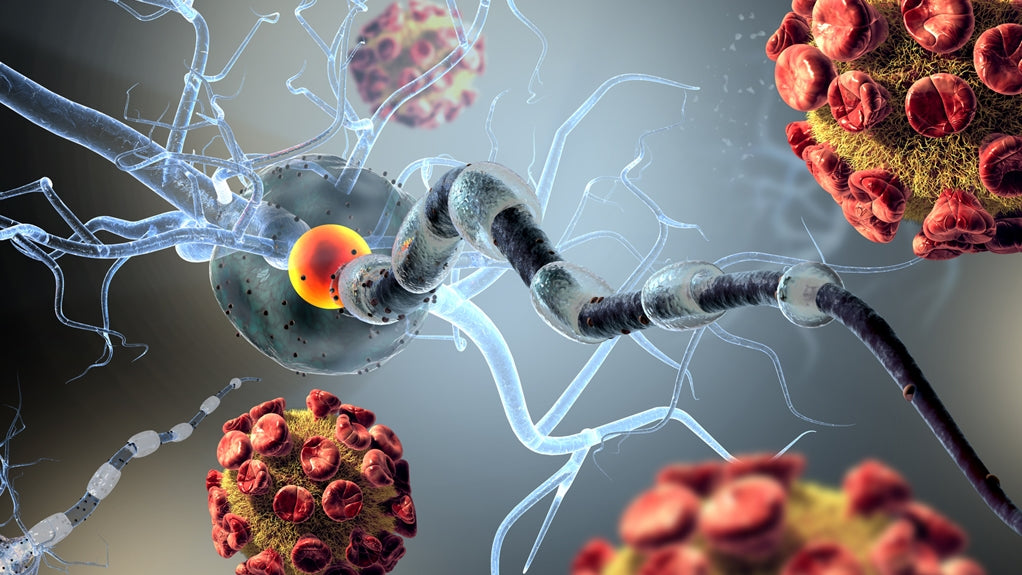
Meaning of multiple sclerosis
Multiple sclerosis (MS) is a chronic, autoimmune disease affecting the central nervous system. During the course of the disease, the immune system mistakenly attacks the protective covering around nerve cells, called the myelin sheath. As a result, the myelin sheath is damaged, which prevents communication between nerve cells and the smooth transmission of nerve impulses.
The symptoms of MS can vary depending on which areas of the nervous system are affected. The most common symptoms include fatigue, muscle weakness, loss of balance, vision problems, sensory disturbances and coordination difficulties. Symptoms usually worsen or subside over time and may occur at different times.
The exact cause of MS is not known, but genetic and environmental factors and immune dysfunction may be involved. The diagnosis of the disease is usually based on symptoms, medical tests and imaging techniques such as MRI scans of the brain and spinal cord.
There is currently no cure for multiple sclerosis, but there are treatments that can help relieve symptoms and slow the progression of the disease. Such treatments include immunomodulatory drugs, steroids, physiotherapy, speech therapy and supportive therapies. It is also important that the person concerned takes good care of their health, maintains a healthy lifestyle and has regular medical check-ups.
Multiple sclerosis is a chronic disease and can have a significant impact on quality of life. However, with the right treatment and support, many people can lead normal lives and manage their symptoms effectively. Guidance from a doctor and lifestyle changes are important in managing the disease and minimising its effects.

Symptoms of multiple sclerosis
The symptoms of multiple sclerosis (MS) can vary and can vary in severity depending on the person affected. In general, the most common early symptoms of MS are:
-
Fatigue: affected people may experience prolonged fatigue and tiredness, even after minimal physical or mental activity.
-
Muscle weakness: Muscle strength and power may be reduced, causing difficulty in walking, lifting or other movements.
-
Loss of balance and coordination: People affected may often experience loss of balance, instability and difficulty coordinating movements.
-
Vision problems: Eye problems may include blurred vision, double vision, colour blurring or loss of field of vision.
-
Sensory disturbances.
-
Speech disorders: MS can sometimes cause speech disorders, including difficulty speaking, slurred speech or difficulty pronouncing phrases.
However, remember that these are only general symptoms and may vary from person to person. With MS, symptoms can change over time and may vary in severity. The exact symptoms and their severity should be individual and assessed and evaluated by a doctor.
Symptoms of multiple sclerosis in women
Multiple sclerosis (MS) symptoms are usually non-specific or exclusive to women. The symptoms of MS can be similar in both men and women, as the disease is central nervous system related and can affect the whole body. The nature and severity of the symptoms of MS depend on the individual and the course of the disease.
Common symptoms of MS, such as fatigue, visual problems, sensory disturbances, muscle weakness and coordination difficulties, can occur in both men and women. Differences in MS are more likely to be seen in the course of the disease and the severity of symptoms between individuals.
It is important to understand that each individual with MS can be unique and the disease affects individuals in different ways. Therefore, to assess the exact symptoms and characteristics of the disease, it is always necessary to consult a doctor who can provide an appropriate diagnosis and treatment based on the individual situation and needs.
Multiple sclerosis and six-year-old Korean ginseng
Panax ginseng, a key component of ancient Chinese-Korean medicine. Researchers are constantly investigating its potential benefits for the body as a whole. Recently, attention has focused on the link between ginseng and Multiple Sclerosis.
For many people, conventional treatments do not always provide complete relief, which is why research is being conducted into the potential of complementary therapies such as ginseng.
Recent research suggests that the ginsenosides found in ginseng may help to manage the symptoms of MS. These active components have been shown to reduce inflammation and boost the immune system.
IMPORTANT! Only 6-year-old Korean ginseng contains enough ginsenoside active ingredients for the body!
Some studies have shown that ginseng can reduce feelings of fatigue, increase energy levels and improve overall quality of life (original research available here). In addition, the anti-inflammatory effects of ginseng may also help to reduce inflammation in the central nervous system caused by MS.
It is important to note that the use of ginseng is not a substitute for conventional MS treatment, but a complement to it. It is strongly recommended that you consult your doctor before starting to take ginseng preparations.
We clearly recommend 100% ginseng preparations as a complementary therapy for MS:




